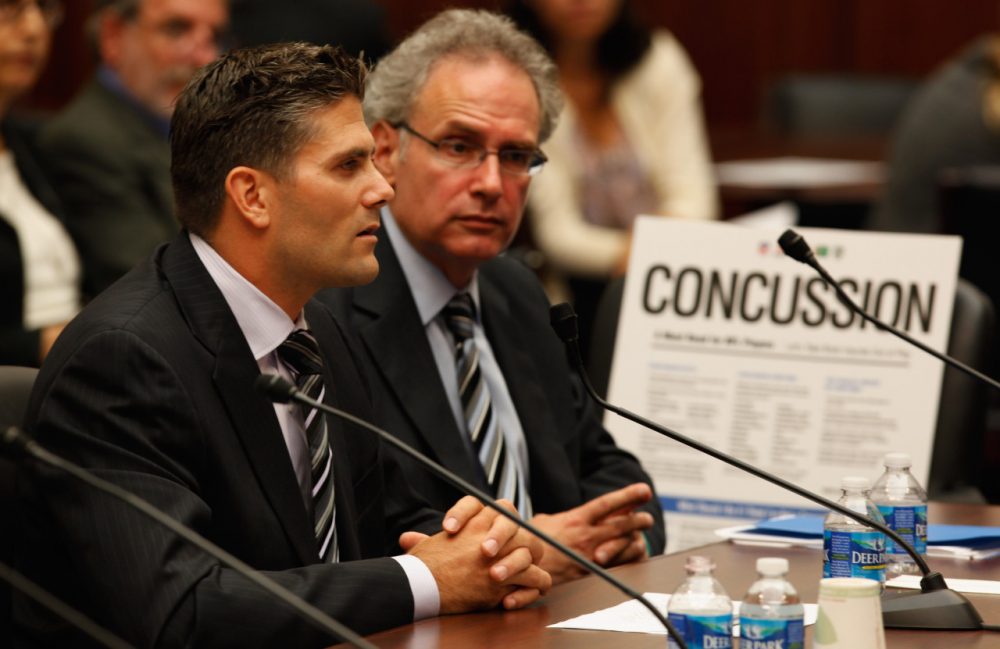Advertisement
Concerns Mount Over NFL Concussion Deal
Resume
The proposed NFL concussion settlement remains a contentious issue. U.S. district judge Anita Brody conferred preliminary approval on the settlement earlier this month, and she will hold a fairness hearing on November 19.
Sports on Earth writer Patrick Hruby is among those speaking out against the settlement. He joined Bill Littlefield.
BL: Seven former players have asked a federal appeals court to intervene on their behalf, what’s their main complaint?
PH: The biggest thing they bring up in their actual appeal and objection is the case of CTE, chronic traumatic encephalopathy. That’s the disease that Mike Webster had, it was found in his brain, it was at the heart of League of Denial.
"The NFL makes a lot of money. The NFL, if it wants, can take care of the guys who are in the worst shape right now."
Patrick Hruby, reporter
However, there’s a cutoff date for that death. You have to have died between January 1, 2006, and July 7, 2014, the date of preliminary approval [for] the settlement. So every single NFL retiree going forward – and there’s about 20,000 of these guys – if they’re still alive to hear this right now, and they die and they have CTE and they suffer, and their families suffer, they’re gonna get nothing for that.
BL: Christopher Seeger, co-lead counsel for the plaintiffs, says the contention by former players that those with CTE will not get paid is something “they just get wrong.” He has said, “If you get sick, period, you get paid.” Should that rebuttal be reassuring?
PH: No. Christopher Seeger is a lawyer. He’s not a scientist, and I’m not sure if he’s aware of the actual science at play here. They’ve found that, in general – this is a recent study, 2013 – they looked at 33 players [who were diagnosed] after death, and they found that there’s basically two groups, two different strains of this, of how the symptoms prevent themselves. One group, the symptoms come when you’re older. They tend to be cognitive, which means you have things like memory loss. You get this in your 50s, your 60s, your 70s. The second group, the symptoms come when you’re younger, and they tend to be things like mood disturbances, behavioral problems.
[sidebar title="Ray Rice Suspension" width="330" align="right"] The NFL suspended Ray Rice for two games after he was charged with domestic violence. Bill Littlefield weighs in on crime and punishment in sports. [/sidebar]This is the group of Junior Seau, this is the group of Dave Duerson, both of whom committed suicide, both of whom were found to have CTE in their brains, both of whom were fairly young when that happened – they were in their 40s. Those kind of symptoms, the settlement does not screen for those. The settlement has what’s called a baseline assessment program. It’s all cognitive tests. So yes, if some of your CTE symptoms overlap with the symptoms of dementia, it may catch that and it may pay out, but it’s not going to catch that or pay out if you have these other symptoms – and by the way, in that study, the group with the emotional mood problems coming out with CTE, they were the larger group. They were twice as big.
BL: Of course, the argument for getting this settlement approved quickly is that there’s a lot of people who need money now, because they’re in real trouble. Is that a compelling argument?
PH: I think that there is a lot of compellingness to that, from a standpoint of, there are players who are in later stages of dementia. Or they have ALS, which is a terrible wasting disease. Or they’ve got Alzheimer’s, or Parkinson’s, and absolutely they should be helped right now. The NFL makes a lot of money. The NFL, if it wants, can take care of the guys who are in the worst shape right now. For that matter, so could the players’ union. So could the top players’ attorneys.
We should make a note here that Chris Seeger, Sol Weiss and four other lawyers who did all the negotiating with the NFL – and did not do any discovery in this case, by the way – did 12 days of negotiations before coming to a settlement. They stand to make a separate payment of $112.5 million. So they’ve got some financial incentive to get it pushed through.
BL: Finally, do you think Judge Brody is likely to approve the settlement as it stands, despite the objections of some of the former players?
[sidebar title="More Coverage" align="right"] Only A Game has been tracking the concussion crisis in sports. Read more here. [/sidebar]PH: That’s a great question, and right now, I’m really not sure. I mean, she seems to be wanting to get this out of her courtroom. The reason I say that is, the objection itself that these seven players filed was actually filed the week before she gave preliminary approval of the settlement. In her preliminary approval notice she said there weren’t any objections. That’s not good for objectors.
That being said, if there is that groundswell among players – if they look at this deal and say, you know what, this isn’t good enough, a bunch of us are gonna opt out, or a bunch more of us are gonna object, or tons of us are gonna show up at that fairness hearing and raise all sorts of problems – and on top of that, if we actually had more concerned in the media, and it becomes a bigger story… all of that together could put pressure on Judge Brody to say, 'You guys need to come up with a better deal.'
This segment aired on July 26, 2014.